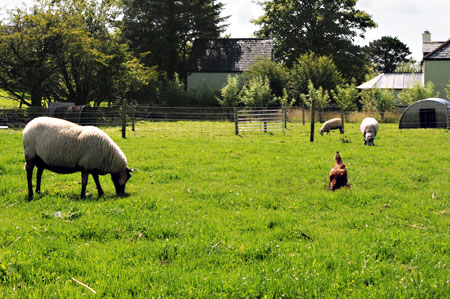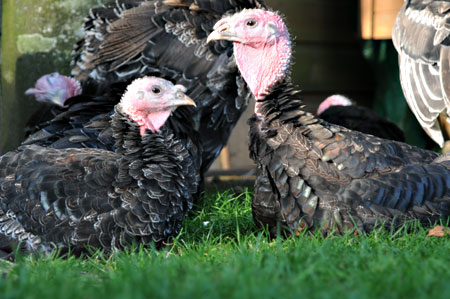Welcome to Relaxed Farming
- Alpacas
- Chickens
- Dairy Goats
- Ducks
- Geese
- Pigs
- Pygmy Goats
- Quail
- Rabbits
- Sheep
- Turkeys
- Polytunnel
- Photo Stories
- Video Stories
- Food
- Smallholding Map
- 2013
- 2014


- August
- September
- October
- November
- December
- January
- February
- March
- April
- May
- June
- July
- August


- 1
- 2
- 3
- 4
- 5
- 6
- 7
- 8
- 9
- 10
- 11
- 12
- 13
- 14
- 15
- 16
- 17
- 18
- 19
- 20
- 21
- 22
- 23
- 24
- 25
- 26
- 27
- 28
- 29
- 30
- 31
Saturday, 31st August 2013
One of the lambs has been hit by flystrike. Flystrike is quite a horrible affliction: the flies lay their eggs on the sheep, the eggs hatch and the resulting maggots then burrow their way into the sheep's fleece and skin. There are various medications that you can use to spray your sheep in order to prevent flystrike and we had in fact sprayed all the sheep just three days ago BUT if the sheep's back end gets mucky due to sloppy poo or if you miss an area when spraying, the flies can still 'strike'.
Our poor lamb had become a tad mucky around his bum and with the warm and humid weather making conditions 'perfect', the flies went to work.
Fortunately, the medication we use to prevent it also works to kill the maggots once they hatch and so within an hour or two of being sprayed in the affected area, the maggots were dead and our poor lamb began to feel better. The life cycle of the fly is quite incredible: a female fly lays her eggs and within a day these have hatched into maggots. The maggots eat whatever the eggs were laid on: a dead animal, rotting rubbish, poo... In the case of our lamb, the fly laid her eggs in the poo-y wool and then when the maggots had eaten the poo they them moved onto the lamb itself, hence burying themselves in its skin. Horrid! After one to two days, the maggots pupate and then emerge as flies and the whole process begins again.
This is why it is important to treat flystike as soon as possible as if you consider that one fly can lay around 75 eggs in one go and the life cycle can be as short as three days, it is not hard to imagine how many flies there might be in a week.
A slightly less unpleasant job for us to do is clipping the turkeys' wings to prevent them flying out of their paddock. The turkeys feel no pain when we do this and they can still enjoy a good run, flap and jump... more on this tomorrow...

